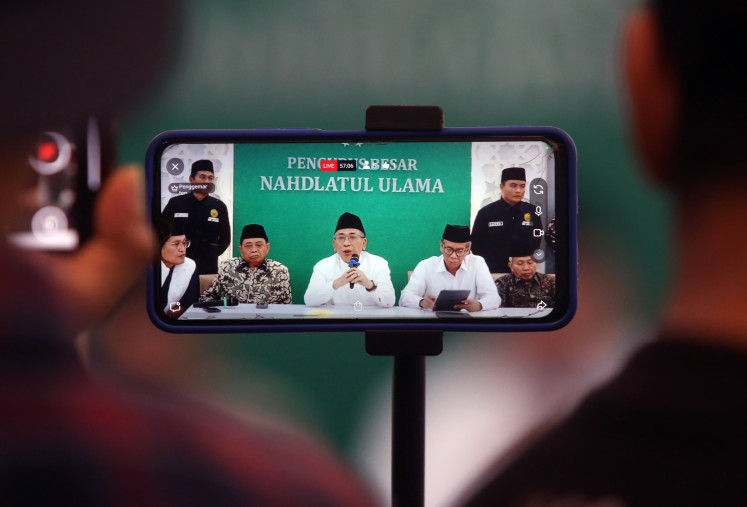Popular Reads
Top Results
Can't find what you're looking for?
View all search resultsPopular Reads
Top Results
Can't find what you're looking for?
View all search resultsNobel Prize teaches Indonesia how to improve economic and public policy research
In most developed nations, economic and statistical data collected by the government are freely accessible to researchers so they can be used to generate research and policy recommendations that are beneficial for society.
Change text size
Gift Premium Articles
to Anyone
T
his year’s Nobel Prize for Economics went to David Card, Joshua Angrist and Guido Imbens. They shared the prize for their new insights in empirical research in economics. Card received the prize for his contribution to labor economics, while Angrist and Imbens for their contribution to causal methods in analyzing economic and social policies.
The three economists have provided us with new understandings of the cause and effect of economic and social policies using real-world events as natural experiments.
Previously in 2014, French economist Jean Tirole won the Economic Nobel prize for providing regulators with a method to control sectors dominated by large businesses using a game theory. Tirole advised that market regulations be carefully designed for specific industrial situations, instead of imposing general regulations such as price ceilings.
Industries that are dominated by a few large corporations will produce undesirable outcomes such as high prices and unproductive companies trying to limit competition. His work advised how governments should regulate monopolies and how to deal with mergers or cartels. Tirole’s work to promote competition between large firms and protect society in general is becoming even more relevant today in Indonesia in the Industry 4.0 era where many large firms are conglomerates and affiliated.
Angrist’s textbook, coauthored with Pisckhe entitled Most Harmless Econometrics has been essential, if not mandatory, reading for empirical researchers. The book discusses the empirical studies that revolutionized the econometric field from highly complex mathematical methods into more applied methods. The use of randomized trials, which resemble clinical trials in medical research provides an ideal benchmark in revealing the most interesting causal relationship questions, for example evaluating the efficacy of medical treatment has resulted in tremendous welfare gains.
However, unlike natural sciences, many important questions in social sciences cannot be addressed using randomized controlled experiments because of ethical, financial and practical issues. For questions such as, “what is the impact of school closures on student learning and student academic outcomes?” Or “what is the effect of one extra year of compulsory education on wages?”
Since experiments are absent, researchers must rely on observational data to address these types of questions. However, with observational data, the underlying cause of correlation remains unclear as correlation does not imply causality. If we observe that minimum wages and unemployment are correlated, the question remains whether it is because minimum wages cause unemployment.
Different estimates obtained from a randomized training program and using observational data from the same program caused the laureates to innovate the design-based approach. In response to previous findings, in the late 1980s economists turned to the use of natural experiment-generated data. In the mid 1990s, Angrist and Imbens made influential contributions to address the challenge of estimating policy effects. They demonstrated that in a realistic setting with individuals’ imperfect compliance to the assignment generated by natural experiments, it was possible to estimate the “local average treatment effect”.
They combined the economics instrumental variable framework with a potential-outcomes approach for causal inference commonly used in statistics. One of Angrist’s influential contributions is on returns to education, or the effect of schooling on earnings. In their 1991 paper, Angrist and Krueger estimated the effect of schooling years on earnings using compulsory schooling-leaving age law in the United States, which stipulates students can drop out of school as soon as they reach age 16.
The individual’s time of birth, meaning the quarter of birth, was used as an instrument to isolate other factors that might have confused the results, such as an individual’s ability or family background. After analyzing a large cohort, Angrist and Krueger found that the effect of education on earnings was greater than previously estimated.
Currently, in Indonesia there is research on policy evaluations conducted by the government, local and international institutions. However, there are still limited studies conducted by academic researchers because of constraints in accessing administrative data.
The COVID-19 pandemic has impacted all aspects of life, including health, economic, social and educational. The impact can be measured in more comprehensive ways using the above empirical methods by employing administrative data. For example, besides assessing the impact of COVID-19 on earnings and the impact of social support, we can evaluate the impact of school closures on student learning and the differential effects for younger children and older children.
In most developed nations, economic and statistical data collected by the government are freely accessible to researchers so they can be used to generate research and policy recommendations that are beneficial for society. Statistical data gathered by the government should be available for research purposes, data such as employment, education/schooling, health coverage and earnings can provide many opportunities for policy evaluations.
Institutional changes, nature and policy changes can be used as natural or quasi-experiments to establish “counterfactual” settings. In general, foreign institutions with less financial constraints can access the data, if not conducting experiments. However, academic researchers are financially constrained so we only rely on small surveys.
As researchers, we hope that the government can provide access to the administrative data for research purposes so that we can conduct studies, which outcomes are policy recommendations to improve the outcomes of the society.
***
The writer is a lecturer at the School of Business and Management, Bandung Institute of Technology. These views are her own.











